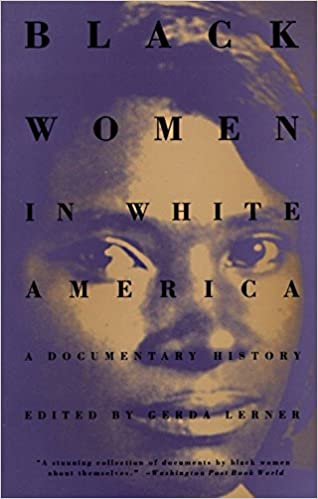An African-American anthology
Editor Gerda Lerner highlights the voices and experiences of Black women throughout history in her book, “Black Women in White America.”
March 4, 2021
“Black Women in White America,” edited by Gerda Lerner, is an anthology of Black women’s personal narratives that date back to 1811. Recognizing the need for Black people to “define themselves autonomously and to interpret their past, their present and their future,” Lerner compiled this anthology to bring focus to both influential Black female leaders and ordinary women. Lerner divides the book into themed sections based on the accumulated primary sources.
The first theme described in the novel is slavery. Lerner prefaces the narratives under the subtitle “A Woman’s Fate” by describing the dynamic between the master and the female slave:
“Black women frequently fought tenaciously though unsuccessfully against the degrading and hated illicit relationship with their masters. In such cases, they suffered cruel punishment until they succumbed. Frequently this drew upon them the hatred and enmity of their mistresses.”
The narratives in this section showcase the dehumanization and sexual exploitation of Black female slaves and the violent punishment they received from the jealous wife of the master.
Pregnant mothers were mercilessly abused and overworked. Newborn infants were brought to the fields and left in the shade. Some mothers worked with the babies tied with a cloth onto their backs. There was little to no recovery time for mothers who had just given birth, which resulted in severe physical pain and a high rate of infant deaths.
“[One woman has a particularly dismal story to tell.] she had had sixteen children, fourteen of whom were dead; she had had four miscarriages: one had been caused with falling down with a heavy burden on her head, and one from having her arms strained to be lashed…”
Black women were forced to procreate with little to no regard for their health during their term or after. The master was often the biological father of these children. White women, infuriated by their husbands’ infidelity, would violently take out their jealousy and anger on the victims.
“Twelve Years A Slave” by Solomon Northup depicts the harassment of one slave, Patsey, by her jealous mistress.
“If she was not watchful while about her cabin, or when walking in the yard, a billet of wood, or broken bottle perhaps, hurled from her mistress’ hand, would smite her unexpectedly in the face…”
This racism manifests itself today in our society in the pervasive dehumanization and hypersexualization of Black women.
“Black people at this moment in history need above all to define themselves autonomously and to interpret their past, their present and their future,” Lerner said.
It is with this knowledge that we can understand how the past has followed us into today, allowing us to take steps now for the future.

